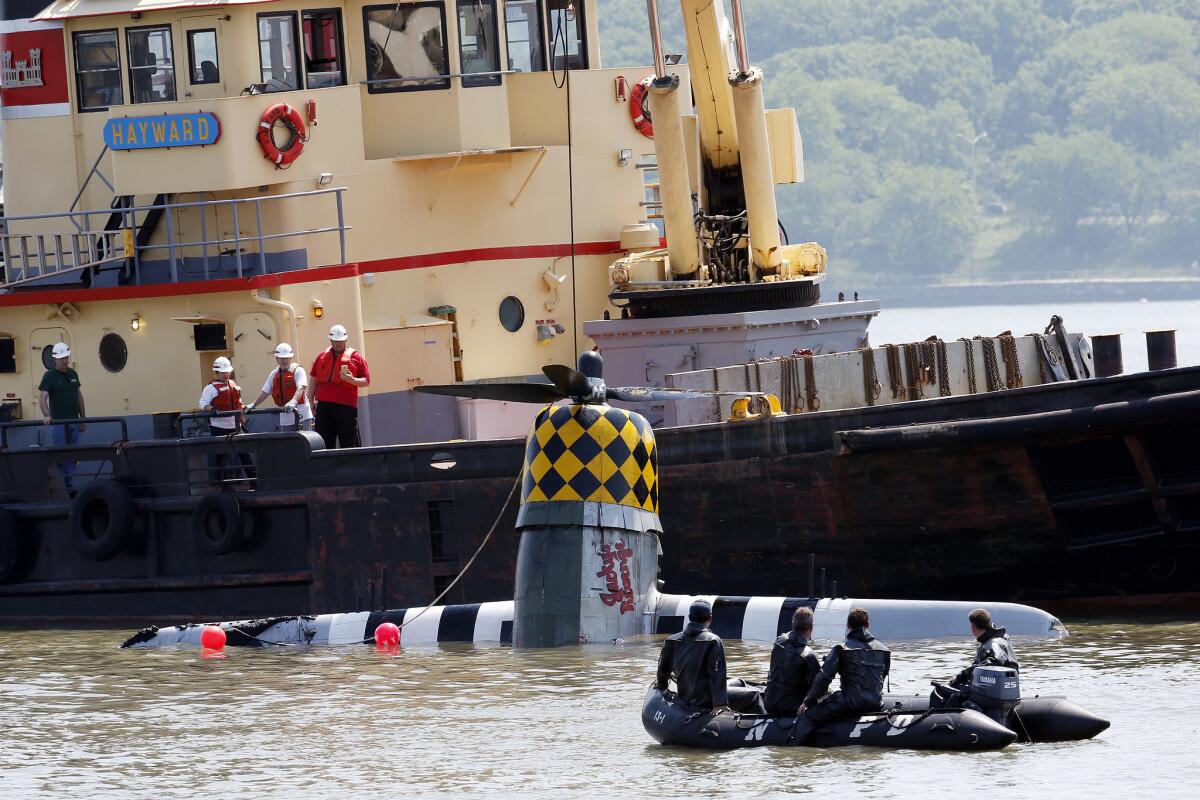World War II plane pulled from Hudson River after crash that killed pilot

Reporting from NEW YORK — Police divers and Army Corps of Engineers personnel retrieved the wreckage of a World War II plane from the Hudson River between New York and New Jersey on Saturday after the vintage aircraft crashed during a promotional flight, killing the pilot.
The P-47 Thunderbolt crashed Friday during a promotion for the American Airpower Museum, which is celebrating the 75th anniversary of the P-47 this weekend.
Scuba divers recovered the body of the pilot, 56-year-old William Gordon, of Key West, Fla., about three hours after the crash.
See more of our top stories on Facebook >>
Gordon was a veteran air show pilot with more than 25 years of experience, according to promotional material for a Key West air show last month. The website for the April air show says Gordon was an “aerobatic competency evaluator” who certified pilots to perform low-level aerobatics.
Scott Clyman, flight operations pilot for the American Airpower Museum, called Gordon “an extraordinary pilot who understood the powerful message our aircraft represent in telling the story of American courage and valor.”
“The FAA will determine the reason for the inflight failure but we know this much. Bill was a nationally respected pilot and we were lucky to call him one of our own,” Clyman said in a statement.
The single-seat P-47 crashed on a part of the river near where a US Airways commercial jet carrying 155 people splash-landed safely in 2009 in what became known as the Miracle on the Hudson.
The plane was loaded onto a barge Saturday and taken to a heliport in lower Manhattan, where investigators from the Federal Aviation Administration and the National Transportation Safety Board can examine it as part of their investigation.
A witness to the crash, Hunter College student Siqi Li, saw smoke spewing from the plane and thought it was doing a trick.
It was tilting down toward the water. I thought they were doing some sort of trick. I didn’t realize it at first, but it was a plane crash.
— Siqi Li, a witness to the crash
“It made kind of a U-turn, and then there was a stream of smoke coming from it,” Li told the Daily News. “It was tilting down toward the water. I thought they were doing some sort of trick. I didn’t realize it at first, but it was a plane crash.”
The FAA said the aircraft, which went down near the George Washington Bridge around 7:30 p.m., was among three planes that had departed from Republic Airport in Farmingdale, on Long Island, just east of New York City. The other two aircraft returned to the airport and landed safely.
NEWSLETTER: Get the day’s top headlines from Times Editor Davan Maharaj >>
Museum spokesman Gary Lewi said the plane was kept at the museum and was taking part in an air show at nearby Jones Beach this weekend.
The P47-Thunderbolts were the heaviest single-engine fighter planes used by Allied forces in World War II. They first went into service in 1942, with the 56th Fighter Group based on Long Island.
The one that crashed in the river flew periodically, including to other air shows, Lewi said.
ALSO
This Chinese laundry ad is racist, but it’s hardly the first
Lesbian adoption ruling reversed by Alabama Supreme Court
96-year-old Dr. Heimlich uses his signature maneuver to help woman choking at senior living center
UPDATES:
11 a.m.: This article was updated with the news that the plane was retrieved from the water as well as additional information.
This article was originally published at 8:18 a.m.
More to Read
Sign up for Essential California
The most important California stories and recommendations in your inbox every morning.
You may occasionally receive promotional content from the Los Angeles Times.










